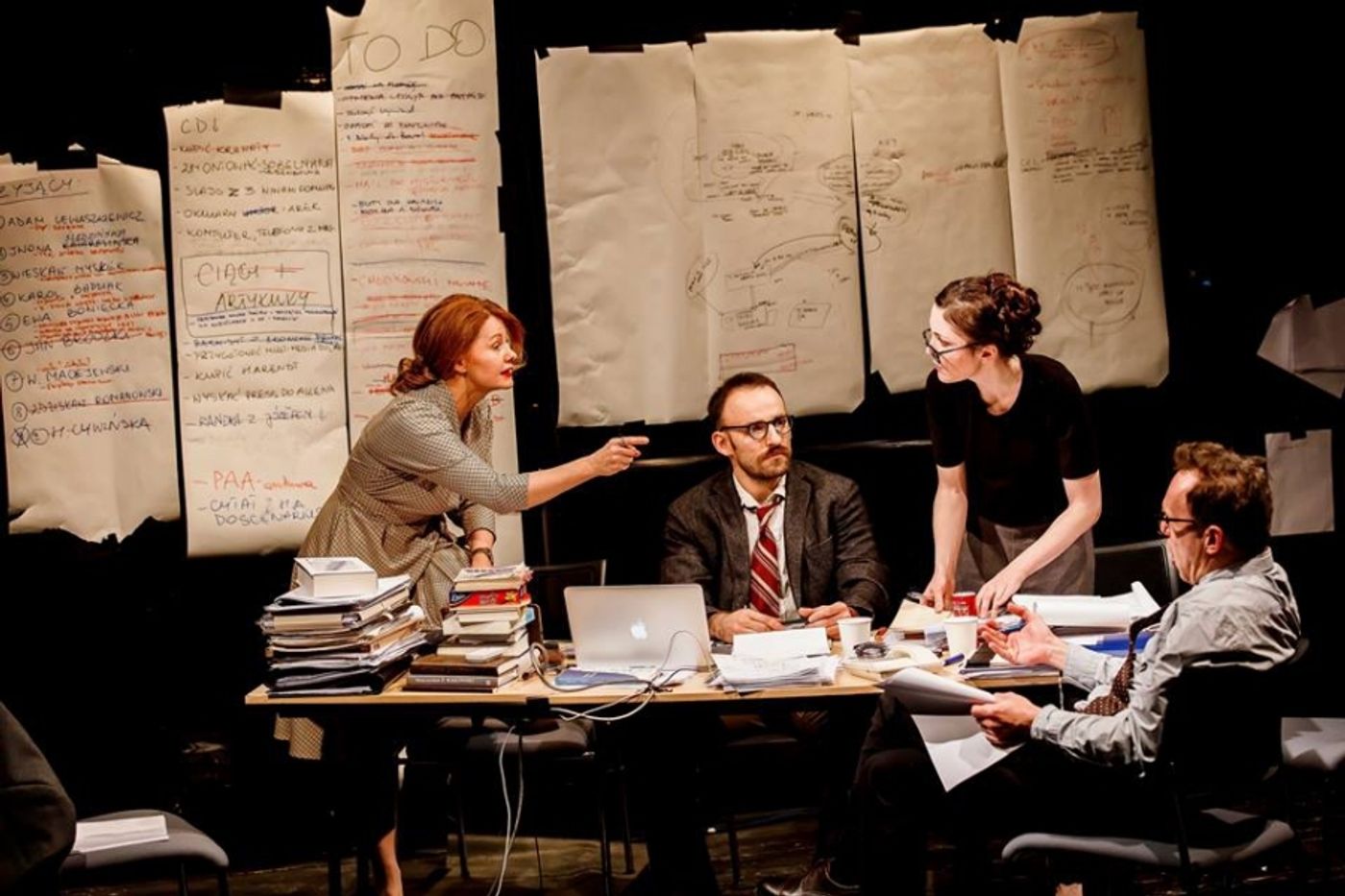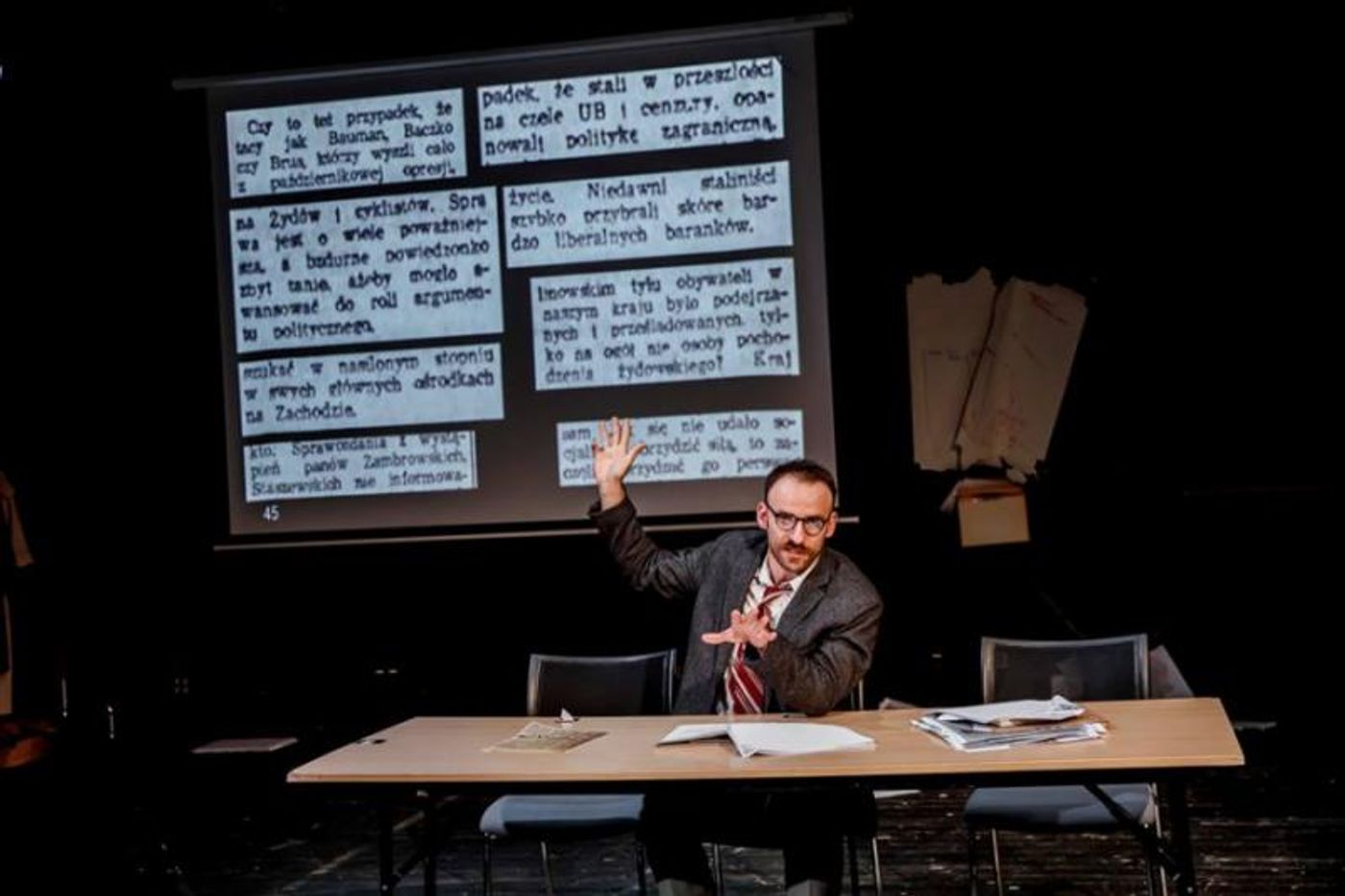Review: JUSTICE at Powszechny Theater - The only thing We can give THEM!

Between 1968 and 1971, thirteen thousand Polish Jews were forced to leave Poland, their homeland. After The Six-Day War in 1967 (the creation of the State of Israel) and students' protests at Polish universities, Wladyslaw Gomulka, the first secretary of the Central Committee of the Polish United Workers' Party, gave a speech on March 8, 1968, which started an anti-Semitic campaign in communist Poland.
He said that most of the protesters were Jewish and suggested that all Jews in Poland were Zionists, and henceforth, they should be called as such. Describing them as Jewish nationalists, he said that they supported the creation of the state of Israel and that they wanted to overthrow the Polish State. Gomulka was trying to ingratiate himself with the Soviet Union because it supported the Arab States, who failed in the Six-Day War. He said that they (meaning Jews in Poland) were a great group of people who neither felt Polish nor Jewish. He claimed that some of them wanted to go to Israel in order to inhabit it. He also presented an initiative, which was to open Polish borders and give emigration passports to all Jews who wanted to leave.
Now 50 years after these events, Michal Zadara along with a team of historians and lawyers are looking for an answer in the play Justice (now playing at Powszechny Theatre). Should someone be prosecuted for the exile of those people?
The set wasn't complicated. We see many notes hanging on the walls. There are two desks, one computer, a few chairs, a kettle and some mugs. It looked like an office where was some brainstorming. The actors were dressed officially like in some corporation.
In fact, the performance takes the form of a lecture where the actors (researchers) present what they have discovered.
I definitely recommend this performance to anyone who doesn't know much about the events of March 1968. In addition to giving us basic information, the actors portray the groups of people who created the main reasons for the expulsion of Polish Jews. There were six of them: rulers, civil servants, headmasters, customs officers, journalists and the general atmosphere created by the rest of society. The ones in power (such as Gomulka who initiated the anti-Semitic campaign or the Ministry of the Interior who instructed his civil servants on how to treat the Jews with complex and humiliating procedures) have been dead for decades. The same goes for the managers and executives who fired all of their Jewish workers immediately after Gomulka's speech. They would now be around 100 years old.
Clerks from the emigration office demanded from those who decided to leave numerous stamps from various institutions to prove that they, for example, had returned all borrowed books to the library or paid all their debts. Additionally, if a Jewish student hadn't finish his studies or hadn't worked for a specific period of time after finishing them, he had to pay the whole costs of his studies. They couldn't take any precious items with them. They were humiliated by customs officers who destroyed personal belongings just for fun. The only inviolable way to move along was to bribe them. There were thousands of clerks and customs officers who were then anonymous, so it is hardly possible to track them down today.

One of the most moving scenes is when the actors discuss the issue of the press. In 1968, many journalists started writing anti-Semitic articles designed to turn the society off to Jewish people. The cruelest and most horrifying of these articles were projected on a screen. Zadara managed to find only three authors of those articles who are still alive. However, the actors explain to the audience all the complex legal issues regarding lapses or crimes against humanity. It turns out that because they were written some 50 years ago, it may not be sufficient to prosecute them. (I was shocked when I realized that one of these three journalists has been a member of the Polish Parliament for almost three decades now). We heard every detail from the interviews with the exiled Jews, which were shown on the screen. All the Jews were persecuted and oppressed. They were thrown over rocks and beaten. They were discriminated against at work and school. Their neighbors waited impatiently for them to leave, hoping that they would find something that the Jews couldn't manage to sell.
The authors of Justice are trying to say that we are the descendants of those who persecuted Jews or those who didn't put in a good word for them. It seems obvious, right? But during the 50th anniversary of the events of March 1968, the Prime Minister of Poland said that all of this was caused by the criminal system of communism. However, if Gomulka's political anti-Semitic slogans had not received public support, they would have remained just slogans.
Zadara's research is imposing and absorbing. He doesn't present just the bare facts, but rather substantial evidence of omnipresent anti-Semitism in Poland 1968 (articles, documents and videos). He captures very well the tragedy of people who were forced to leave their homeland without the means to survive and provided with a 'travel document' that stated the owner of this document was "stateless". So, why are we talking about something that happened 50 years ago? What is the point of writing a notification of the possibility of a crime being committed by the three journalists? What we can give to the exiled Jews who are still alive if the present government and most Polish people claim that they have nothing to do with it? JUSTICE.
(photo credit: Krzysztof Bielinski)
Reader Reviews
Videos


